Daily Vocabulary Words: List of Daily Used Words in Leading International Newspapers
Hi there. Welcome to this special section @ Wordpandit.
Our endeavour here is very simple: to highlight important daily vocabulary words, which you would come across in leading newspapers in the country. We have included the following newspapers in our selection:
• The New York Times
• The Washington Post
• Scientific American
• BBC
• The Guardian
• Psychology Today
• Wall Street Journal
• The Economist
We are putting in extensive work for developing your vocabulary. All you have got to do is be regular with this section and check out this post on a daily basis. This is your repository of words that are commonly used and essentially, we are posting a list of daily used words. Hence, this has significant practical application as it teaches you words that are used commonly in leading publications mentioned above.
Visit the website daily to learn words from leading international newspapers.
WORD-1: Chronically
CONTEXT: What matters is compensation for the thousands of chronically ill people and their families for half a century of pain and in some cases.
SOURCE: Washington Post
EXPLANATORY PARAGRAPH: Imagine you have a toy that breaks a lot. If it breaks almost all the time, you could say it breaks “chronically.” That means something happens again and again over a long time.
MEANING: Describes something that happens repeatedly over a long period (Adverb).
PRONUNCIATION: kruh-NI-kuh-lee
SYNONYMS: Constantly, Habitually, Persistently, Continuously, Regularly, Frequently.
USAGE EXAMPLES:
1. She is chronically late to school.
2. His phone is chronically out of battery.
3. The garden is chronically overrun with weeds.
4. He is chronically forgetful about his keys.
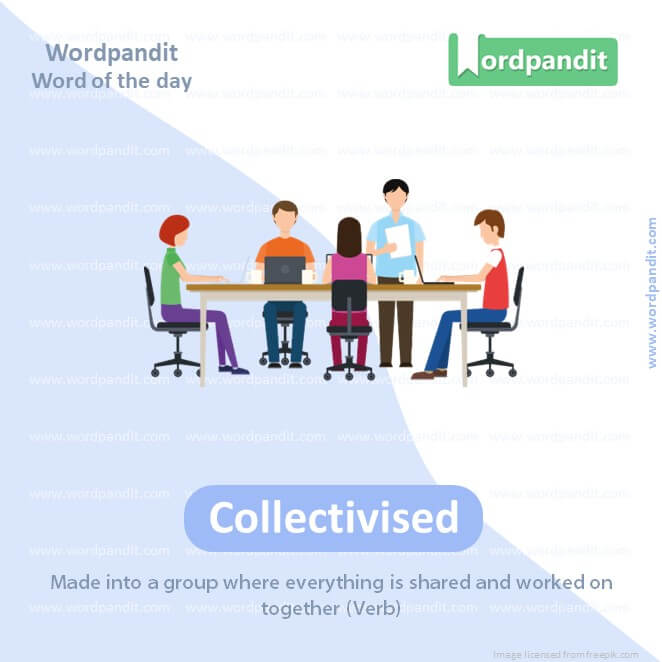
WORD-2: Collectivised
CONTEXT: The government machine draws its wagons into a circle and does everything to defend its reputation, past as well as present, and not distress the Treasury. Blame collectivised is blame denied.
SOURCE: The Guardian
EXPLANATORY PARAGRAPH: If a bunch of farms or businesses start working together like they’re one big team, sharing everything they make or earn, they’ve been “collectivised.” It’s like if you and your friends share your toys and play together.
MEANING: Made into a group where everything is shared and worked on together (Verb).
PRONUNCIATION: kuh-LEK-tih-vyzd
SYNONYMS: Unified, Consolidated, Centralized, Integrated, Combined, Amalgamated.
USAGE EXAMPLES:
1. The farms in the village were collectivised.
2. She read a book about collectivised industries.
3. The workers collectivised their efforts.
4. The collectivised system improved production.
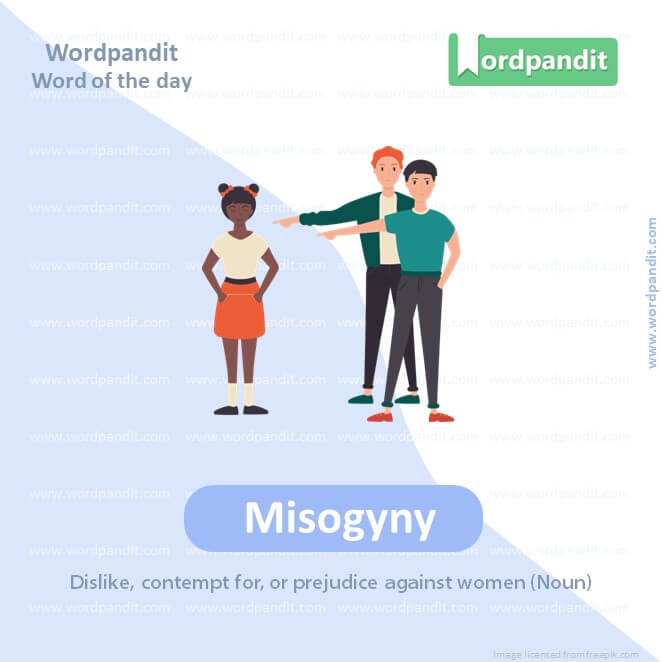
WORD-3: Misogyny
CONTEXT: We have problems of discrimination, misogyny, sexual violence, domestic violence.
SOURCE: New York Times
EXPLANATORY PARAGRAPH: Misogyny is when someone doesn’t like or respect girls and women just because they are girls and women. It’s not nice to think someone is not good just because of their gender.
MEANING: Dislike, contempt for, or prejudice against women (Noun).
PRONUNCIATION: mi-SOJ-uh-nee
SYNONYMS: Sexism, Chauvinism, Antifeminism, Male Chauvinism, Woman-hating.
USAGE EXAMPLES:
1. The movie was criticized for its misogyny.
2. He challenged the misogyny in the workplace.
3. Misogyny is a serious social issue.
4. The book discusses historical misogyny.
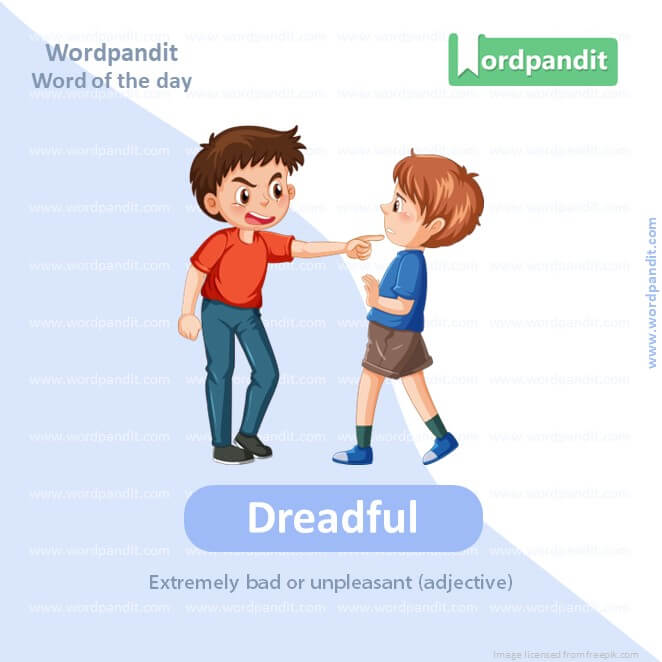
WORD-4: Dreadful
CONTEXT: This sense of national failure? Why our dreadful public services, polluted waterways, declining health outcomes and the self-harm of Brexit?
SOURCE: The Guardian
EXPLANATORY PARAGRAPH: When something is really bad or scary, like a big monster in a story, you can say it’s “dreadful.” It’s a word you use when something is not nice at all.
MEANING: Extremely bad or unpleasant (adjective).
PRONUNCIATION: DRED-ful
SYNONYMS: Awful, Horrible, Terrible, Frightful, Ghastly, Horrific.
USAGE EXAMPLES:
1. She had a dreadful nightmare.
2. The weather today is dreadful.
3. He gave a dreadful scream.
4. The news reported a dreadful accident.
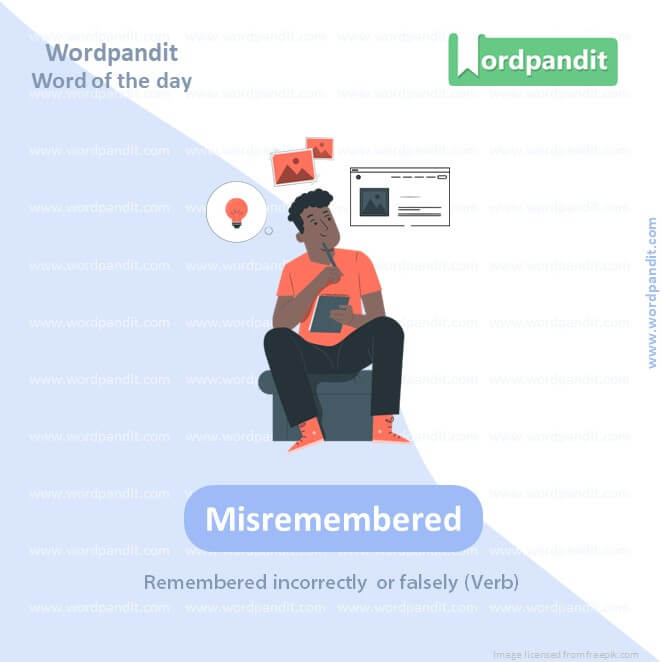
WORD-5: Misremembered
CONTEXT: The supposed glories of a misremembered past used as a distraction from an uncertain future.
SOURCE: The Guardian
EXPLANATORY PARAGRAPH: Sometimes, when you try to remember something, but you don’t remember it correctly, you have “misremembered” it. It’s like thinking you left your toy in the living room, but it’s actually in your bedroom.
MEANING: Remembered incorrectly or falsely (Verb).
PRONUNCIATION: mis-ri-MEM-berd
SYNONYMS: Forgot, Mistaken, Confused, Misrecalled, Misconstrued, Misinterpreted.
USAGE EXAMPLES:
1. He misremembered the date of the meeting.
2. I think you’ve misremembered what she said.
3. She misremembered the way to the park.
4. The story was misremembered over the years.
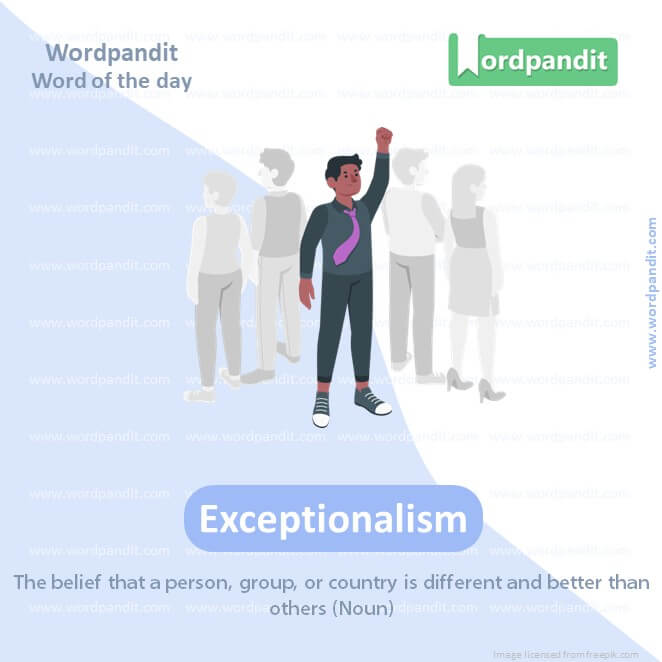
WORD-6: Exceptionalism
CONTEXT: Allowing people you wouldn’t trust with your wallet or to babysit your children to rise through deceit and thrive through failure. We boast of “British exceptionalism.”
SOURCE: Washington Post
EXPLANATORY PARAGRAPH: Exceptionalism is like thinking you or your group is special and different from everyone else in a good way. It’s like believing your soccer team is the best of all the teams.
MEANING: The belief that a person, group, or country is different and better than others (Noun).
PRONUNCIATION: ik-SEP-shuh-nuh-liz-um
SYNONYMS: Superiority, Distinctiveness, Uniqueness, Specialness, Exclusivity.
USAGE EXAMPLES:
1. American exceptionalism is a popular topic in history.
2. He has a sense of personal exceptionalism.
3. The book discusses cultural exceptionalism.
4. The idea of exceptionalism can be controversial.
WORD-7: Calibrated
CONTEXT: American Armalite rifles fire ammunition calibrated in millimetres.
SOURCE: Al Jazeera
EXPLANATORY PARAGRAPH: Imagine you have a ruler to measure things. If you make sure the ruler measures things exactly right, you have “calibrated” it. It means adjusting something to be accurate.
MEANING: Carefully adjusted or set to a specific function or standard (Verb).
PRONUNCIATION: KAL-ih-bray-tid
SYNONYMS: Adjusted, Tuned, Set, Configured, Aligned, Fine-tuned.
USAGE EXAMPLES:
1. The scale was calibrated for accuracy.
2. He calibrated the telescope to see the stars.
3. The machine needs to be calibrated regularly.
4. She calibrated her watch to the correct time.
WORD-8: Obscurantism
CONTEXT: The genius of the British unwritten (more accurately, uncodified) constitution is deliberate obscurantism. Constitutional smoke.
SOURCE: Al Jazeera
EXPLANATORY PARAGRAPH: Obscurantism is when people make things confusing on purpose so it’s hard for others to learn or understand. It’s like if someone mixed up all the pieces of a puzzle to make it harder for you to solve.
MEANING: The practice of deliberately preventing the facts or full details of something from becoming known (Noun).
PRONUNCIATION: ob-SKYUR-uhn-tiz-um
SYNONYMS: Secrecy, Confusion, Mystification, Vagueness, Evasiveness.
USAGE EXAMPLES:
1. The government was accused of obscurantism.
2. Obscurantism can hinder scientific progress.
3. The article criticized the obscurantism in the law.
4. He was known for his obscurantism on controversial topics.
WORD-9: Commendable
CONTEXT: The fact that Meloni made any address at all is, arguably, commendable.
SOURCE: New York Times
EXPLANATORY PARAGRAPH: When you do something really well or really good, like sharing your toys or getting a good grade, it’s “commendable.” It means you did something that people think is very good.
MEANING: Deserving praise or approval; admirable (Adjective).
PRONUNCIATION: kuh-MEN-duh-bul
SYNONYMS: Praiseworthy, Admirable, Laudable, Worthy, Meritorious, Noteworthy.
USAGE EXAMPLES:
1. Her efforts in the project were commendable.
2. He showed commendable bravery.
3. The team’s performance was commendable.
4. It’s commendable how much he has helped.
WORD-10: Feminine
CONTEXT: Stereotypically feminine traits such as being caring, supportive and sensitive.
SOURCE: The Guardian
EXPLANATORY PARAGRAPH: Feminine is a word that describes things that are like girls or women. It can be about how someone looks, like wearing a dress, or how they act, like being gentle.
MEANING: Having qualities traditionally associated with women (Adjective).
PRONUNCIATION: FEM-uh-nin
SYNONYMS: Womanly, Ladylike, Girlish, Female, Delicate, Graceful.
USAGE EXAMPLES:
1. She has a feminine style of dressing.
2. The room had a feminine touch.
3. He admired her feminine qualities.
4. The perfume had a feminine scent.
Vocabulary Today
In the dynamically evolving spectrum of language, staying updated with ‘vocabulary today’ is an integral part of mastering a language. These topical, contemporary words breathe vitality into our communication, bridging the gap between language learning and language living. But, how can we effectively learn ‘vocabulary today’?
Grasping ‘vocabulary today’ begins with exposure to contemporary contents. Engaging with current publications, social media platforms, movies, music, podcasts, and digital content can dive you into the real-world usage of ‘vocabulary today’. These platforms imbibe the vocabulary of the day, reflecting the evolution in language.
To consolidate the learning of ‘vocabulary today’, utilize memory-enhancing tools. Flashcards, language learning apps, or memory-enhancement software can make your study session an engaging venture and enhance word retention.
However, the secret sauce to learning ‘vocabulary today’ is practice. Inculcating these words in your regular dialogues, written correspondences, or social media posts will reinforce your grasp over these words. It brings you closer to ‘vocabulary today’, enhancing your language adaptability and fluency.
Better understanding of ‘vocabulary today’ can be achieved by staying connected with diverse social platforms which bring words from across locations and cultures, expanding your linguistic understanding. Also, participating in language forums, discussion groups, or language exchange platforms provides great insights into ‘vocabulary today’.
In the final analysis, staying abreast with ‘vocabulary today’ is an exciting quest that requires consistent exposure, active practice, and social engagement. As you embrace this journey, you will find your language proficiency growing with every new word, enabling you to step into the dynamic world of contemporary language with confidence and mastery. Remember, ‘vocabulary today’ is not static, it flows like a river, always fresh, always changing, and always enriching!











